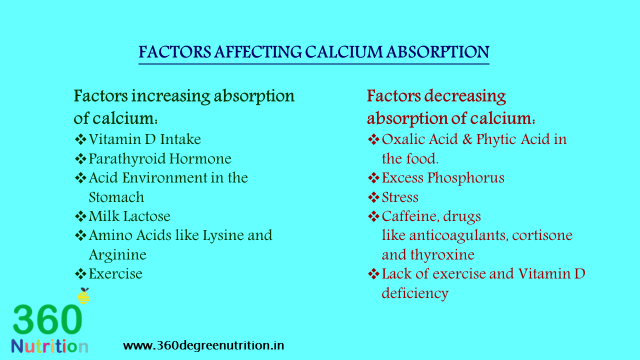Get the App
For Doctors
Login/Sign-up
Last Updated: Aug 29, 2019
BookMark
Report
FACTORS AFFECTING CALCIUM ABSORPTION
Incorporating healthy foods in the diet is not enough. One should understand factors affecting the absorption of nutrients from the food. Some factors are responsible for increased absorption of particular nutrient whereas some decreases its absorption. Calcium is the hardest mineral to get absorbed in the body. 30-80 % of the dietary calcium is not getting absorbed in the adult body.
Factors increasing absorption of calcium:
1. Vitamin d: vitamin d works in the digestive tract to absorb calcium into the blood stream from the walls of the duodenum. Vitamin d also helps maintain normal blood calcium level.
2. Parathyroid hormone: it increases calcium transport across the membrane of intestinal cells.
3. Acid environment: hydrochloric acid secreted in the stomach during the process of digestion is required for the absorption of calcium in the duodenum. Calcium supplements could be taken with magnesium at bedtime or between meals due to the acid environment needed in the stomach to assimilate the calcium. Always consult a physician before beginning a new supplement regimen.
4. Milk lactose: it favors absorption in infants. Lactose is acted upon by intestinal microbial flora to form acid which causes lowering of ph which makes calcium more soluble.
5. Amino acids: supplemental calcium is often chelated, or combined with protein molecules called amino acids, to help the body absorb them during digestion. Lysine and arginine increase calcium absorption.
6. Exercise: exercise along with vitamin d intake helps calcium absorption thereby making bones strong.
Factors decreasing absorption of calcium:
1. Oxalic acid& phytic acid: foods that are high in oxalic acid such as spinach, chard and chocolate, reduce calcium absorption. Oxalic acid binds with the calcium to form a salt crystal, calcium oxalate which cannot be absorbed. Phytic acid, which is found in whole-grain foods and high-fibre foods, effects calcium absorption the same way.
2. Phosphorus: too much phosphorus in the diet causes precipitation of calcium in the form of calcium phosphate.
3. Stress: stress can have a negative effect on hcl production in the stomach and on normal digestive behaviour in the body, and can therefore have a negative effect on calcium absorption.
4. Caffeine, drugs like anticoagulants, cortisone and thyroxine reduce calcium absorption.
5. Lack of exercise and vitamin d deficiency leads to decrease calcium absorption.
Factors increasing absorption of calcium:
1. Vitamin d: vitamin d works in the digestive tract to absorb calcium into the blood stream from the walls of the duodenum. Vitamin d also helps maintain normal blood calcium level.
2. Parathyroid hormone: it increases calcium transport across the membrane of intestinal cells.
3. Acid environment: hydrochloric acid secreted in the stomach during the process of digestion is required for the absorption of calcium in the duodenum. Calcium supplements could be taken with magnesium at bedtime or between meals due to the acid environment needed in the stomach to assimilate the calcium. Always consult a physician before beginning a new supplement regimen.
4. Milk lactose: it favors absorption in infants. Lactose is acted upon by intestinal microbial flora to form acid which causes lowering of ph which makes calcium more soluble.
5. Amino acids: supplemental calcium is often chelated, or combined with protein molecules called amino acids, to help the body absorb them during digestion. Lysine and arginine increase calcium absorption.
6. Exercise: exercise along with vitamin d intake helps calcium absorption thereby making bones strong.
Factors decreasing absorption of calcium:
1. Oxalic acid& phytic acid: foods that are high in oxalic acid such as spinach, chard and chocolate, reduce calcium absorption. Oxalic acid binds with the calcium to form a salt crystal, calcium oxalate which cannot be absorbed. Phytic acid, which is found in whole-grain foods and high-fibre foods, effects calcium absorption the same way.
2. Phosphorus: too much phosphorus in the diet causes precipitation of calcium in the form of calcium phosphate.
3. Stress: stress can have a negative effect on hcl production in the stomach and on normal digestive behaviour in the body, and can therefore have a negative effect on calcium absorption.
4. Caffeine, drugs like anticoagulants, cortisone and thyroxine reduce calcium absorption.
5. Lack of exercise and vitamin d deficiency leads to decrease calcium absorption.



+1.svg)
